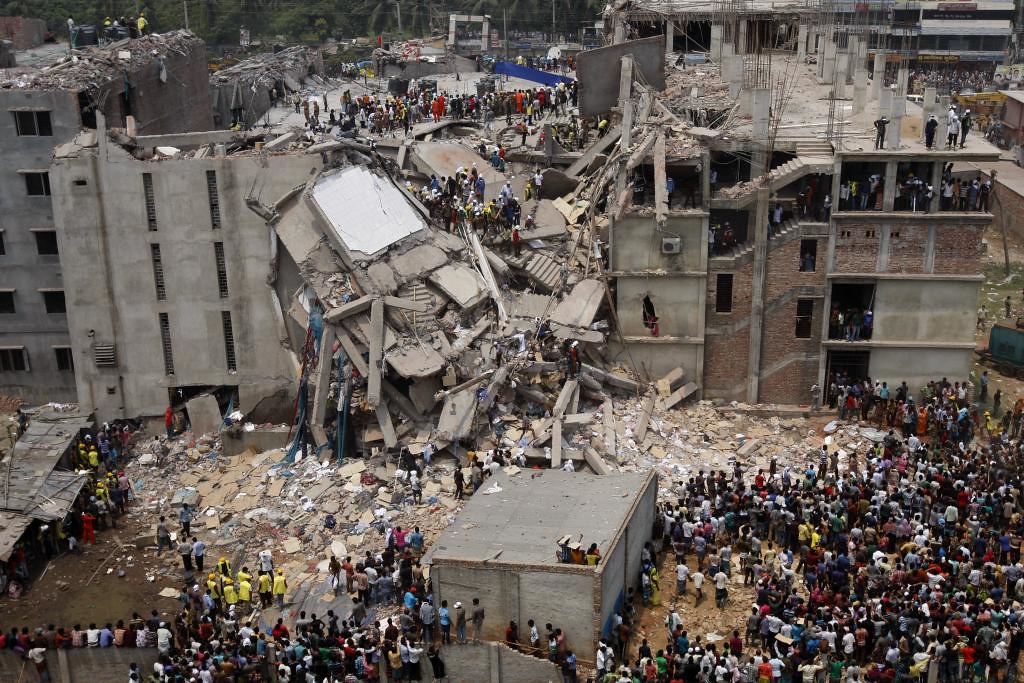Bangladesh: Major ILO programme aims to make garment industry safer
DHAKA (ILO NEWS) - The Government of Bangladesh (GoB) and the International Labour Organization have launched a major initiative – including a new Better Work programme -aimed at improving working conditions in the ready-made garment (RMG) industry in Bangladesh.
The three-and-a-half year initiative, ‘Improving Working Conditions in the Ready-Made Garment Sector’ - (RMGP) focuses on minimizing the threat of fire and building collapse in ready-made garment factories and on ensuring the rights and safety of workers.
It has been developed in collaboration with government, employers’ and workers’ representatives, in response to a number of industrial accidents in the sector, including the Rana Plaza building collapse in April, in which more than 1,100 workers died.
“The ready-made garment industry is vital to Bangladesh’s economic growth but it needs to be safe and sustainable,” said ILO Director-General, Guy Ryder. “This programme supports the National Tripartite Plan of Action on fire safety and structural integrity and will lead to lasting improvements in working conditions for the tens of thousands of garment factory workers in Bangladesh.”
The three-and-a-half year initiative, ‘Improving Working Conditions in the Ready-Made Garment Sector’ - (RMGP) focuses on minimizing the threat of fire and building collapse in ready-made garment factories and on ensuring the rights and safety of workers.
It has been developed in collaboration with government, employers’ and workers’ representatives, in response to a number of industrial accidents in the sector, including the Rana Plaza building collapse in April, in which more than 1,100 workers died.
“The ready-made garment industry is vital to Bangladesh’s economic growth but it needs to be safe and sustainable,” said ILO Director-General, Guy Ryder. “This programme supports the National Tripartite Plan of Action on fire safety and structural integrity and will lead to lasting improvements in working conditions for the tens of thousands of garment factory workers in Bangladesh.”
 |
| From Left to Right: Mr Gerben Sjoerd de Jong, H.E. Ambassador of the Netherlands in Bangladesh; Mr Abul Kalam Azad, Secretary, Economic Relations Division (ERD) GoB; Mr Srinivas Reddy, Director, ILO Country Office for Bangladesh; Mr Robert W. Gibson, H.E. the British High Commissioner to Bangladesh |
The United Kingdom and the Netherlands are jointly contributing US$15 million to the US$24.21 million programme. The ILO is mobilizing further resources.
Safety and rehabilitation
The RMG programme will provide technical support to building and fire safety assessments; strengthen and support labour, fire and building inspections; build occupational safety and health awareness, capacity and systems and provide rehabilitation and skills training for the victims of Rana Plaza and Tazreen Fashions, where 112 workers died in a fire in November 2012.“Rana Plaza and Tazreen became the symbols of what is wrong in the RMG sector. Now Bangladesh, supported by the international community, has the chance to get it right,” said Gerben Sjoerd de Jong, Ambassador of the Netherlands in Bangladesh.
“The Netherlands support this ILO programme because it contains all the crucial elements to make the garment sector safe and sustainable. For us this is a perfect example of using aid to promote responsible trade,” he added.
Sarah Cooke, head of the UK Department for International Development (DFID) in Bangladesh said, “The sustainability of the ready-made garment industry has a pivotal role to play in Bangladesh's continued social and economic development. This programme is a key part of the UK's approach to help ensure safe working conditions and improved productivity in the sector.”
It compliments other initiatives to improve safety in RMG factories such as the Sustainability Compact adopted by the European Union, Bangladesh Government and the United States, and supported by the ILO; the Accord on Fire and Building Safety in Bangladesh, which comprises global unions, brands and retailers, and the Alliance for Bangladesh Worker Safety, which brings together North American retailers and brands.
This programme builds on ongoing ILO interventions and complements the Fire Safety, Fundamental Principles and Rights at Work and Labour Relations initiatives funded by the US Department of Labor and the Kingdom of Norway.
Better Work
As part of the new programme, the ILO and the International Finance Corporation (IFC) also announced the launch of a Better Work programme in Bangladesh. This will complement the RMG programme by implementing factory-level activities to improve compliance with national labour laws and respect for international core labour standards, while promoting the competitiveness of participating factories.Better Work Bangladesh is a partnership with government, employers, workers, international buyers and other relevant stakeholders, to promote sustainable change in the ready-made garment sector by helping factories comply with labour laws and building the capacity for labour administration and industrial relations.
In the spirit of this partnership, the Government of Bangladesh and Better Work have agreed to link continuation of the programme to progress being made on specific commitments, as laid out in a “Framework for Continuous Improvement.” Such progress on the Framework will be reviewed annually by Better Work, in cooperation with the Government.
Key partners of the RMG project include, Ministry of Labour and Employment; Ministry of Housing and Public Works; Ministry of Home Affairs; National Tripartite Committee on Fire and Building Safety; Dhaka Development Authority (RAJUK); Bangladesh University of Engineering and Technology (BUET); Department of Fire Service and Civil Defence; Bangladesh Garment Manufacturers and Exporters Association (BGMEA); Bangladesh Knitwear Manufactures and Exporters Association (BKMEA); Bangladesh Employer’s Federation (BEF); National Coordination Committee for Worker’s Education (NCCWE); IndustriALL Bangladesh Council (IBC).
Better Work Bangladesh will be funded by the governments of Switzerland and the United States, and through the RMG programme by the governments of the Netherlands and the United Kingdom. The Better Work global programme is funded by the governments of Australia, the Netherlands and Switzerland.













